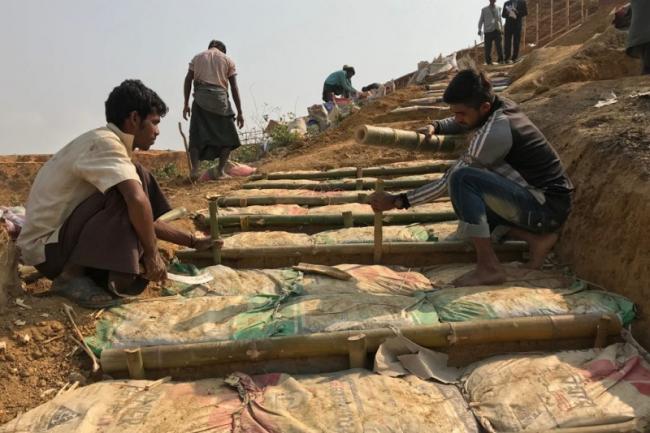
Ahead of monsoon season, UN supports Bangladesh’s efforts to protect Rohingya camps from flooding
New York, Feb 3 (JEN): The United Nations refugee agency and its partners are ramping up to assist Bangladesh’s efforts to mitigate some expected impacts of the upcoming monsoon season in the country, during which, according to an initial risk analysis, at least 100,000 Rohingya refugees could be in grave danger from landslides and floods.
“The adverse weather conditions, including potential cyclones, could put tens of thousands of Rohingya refugees staying at the highly congested settlements in Cox’s Bazar district at serious risk,” Andrej Mahecic, spokesperson for the Office of the UN High Commissioner for Refugees (UNHCR) told reporters at the regular press briefing in Geneva, Switzerland, on Friday.
The findings of an initial risk analysis of the world’s largest refugee settlement area in Kutapalong and Balukhali indicate that at least 100,000 of the more than 569,000 refugees there could be in grave danger from landslides and floods.
Up to one third of the settlement area could be flooded. As a result, more than 85,000 refugees could lose their shelters. Another 23,000 refugees living on steep slopes within the site could be at risk of landslides, Mahecic said.
Key services in the settlement are also at risk of being washed away, including latrines, washrooms, tube wells, and health centres, and access roads into the settlements could be blocked and inaccessible to vehicles, making it hard to provide emergency aid. There is also a high risk for public health situation, especially of outbreaks of communicable diseases, he added.
The Government of Bangladesh has acknowledged and committed to addressing these concerns, while UN and humanitarian partners have set up an emergency preparedness group to co-ordinate these efforts.
UNHCR has already taken a number of steps, including provision of biodegradable sandbags to help anchor the structures in heavy rains.
Several engineering projects are also underway to build bamboo-reinforced footpaths and stairs, raised bridges, bamboo/brick/concrete retaining walls for soil stabilisation and drainage networks.
The work is scheduled to start within the next few weeks to level some of the steep hilltops to reduce the risk of landslides, as well as to increase the amount of useable area.
A relocation of some families living in the most precarious parts of the camp will also start soon.
Early warning systems are also being put in place, with public information campaigns also underway. UNHCR is also working with the Bangladeshi authorities and other key operational agencies to pre-position materials and heavy-lifting machinery.
The humanitarian crisis caused by escalating violence that has driven Rohingya Muslims from Myanmar’s Rakhine state is causing suffering on a catastrophic scale. As of 11 December, there are nearly 860,000 Rohingya refugees in Cox’s Bazar – of whom 655,000 have arrived since 25 August 2017.
Photo: UNHCR/Caroline Gluck
Support Our Journalism
We cannot do without you.. your contribution supports unbiased journalism
IBNS is not driven by any ism- not wokeism, not racism, not skewed secularism, not hyper right-wing or left liberal ideals, nor by any hardline religious beliefs or hyper nationalism. We want to serve you good old objective news, as they are. We do not judge or preach. We let people decide for themselves. We only try to present factual and well-sourced news.







